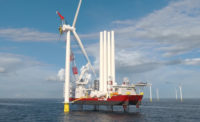ENR 2021 Top 25 Newsmakers
Shawn M. LaTourette: State Leader Seeks Balance to Deploy NJ's Pioneering Environmental Justice Law

LaTourette (right) interracts with community members in one town affected by flooding from Hurricane Ida last year during a U.S. Army Corps of Engineers tour.
Photo: New Jersey Dept. of Environmental Protection
New Jersey’s small size has not meant less impact to its communities from pollution and climate change, but short travel distances have made it easier for Shawn M. LaTourette to see the effects up close and pursue a mission to prevent further harm and still boost the state economy.
As NJ Dept. of Environmental Protection Commissioner, he has presided over a daunting process still underway to develop and implement New Jersey’s pioneering environmental justice law, enacted in 2020, and leads work on related priorities on which the state is at the forefront nationally—from making offshore wind a clean energy reality and phasing in cleaner trucks to boosting removal of lead-lined water system pipes and regulating harmful PFAS chemicals.
Related Article:
Room to Breathe: Industrial Projects and Communities Are Challenged to Coexist
Back to:
25 Top Newsmakers
To implement the environmental justice law, intended to reduce further risk to “overburdened” communities, stakeholders now await regulatory details on how or whether certain pollution-emitting facilities such as power plants and waste incinerators can be built or expanded.
New Jersey initially noted 310 communities that could fall under the standard.
The law, for the first time in the U.S., enables regulators to consider cumulative pollution and climate change impacts to a community and to deny or alter a facility permit based on that assessment.
More states are pushing environmental justice efforts, but none so far have New Jersey’s level of enforcement.
Extended Outreach
LaTourette has reached out to both community and business advocates to gain input in crafting the permit rules, earning kudos for his even-handed approach. “This law is not about beating anyone over the head, it’s about doing better,” says the DEP chief, an attorney who before joining the state environmental agency in 2018 as a policy advisor had worked with both communities and business on environmental legal and compliance issues.
Rising up the agency's ranks since, he also has been central to developing its new energy master plan and in launching a program in December to phase out diesel trucks in the state by 2035, the first state east of the Mississippi River to do so. Transportation generates 40% of the state's greenhouse gases, with medium and heavy-duty trucks making up 25% of that.
NJ Gov. Phil Murphy tapped him last April to permanently fill DEP’s top role.
Newark-based activist Maria Lopez-Nuñez has been impressed with the environmental justice process that included broad input at such an early stage. “I would love to see this as a model of what public engagement looks like,” she says. “It will be a real test of what communities are waiting for.”
Ray Cantor, vice president of the NJ Business and Industry Association, says the group is "optimistic that DEP will listen to our concerns … and adopt a workable system for everyone.”
LaTourette is heartened to have “all of these desperately interested folks compliment the process,” he says. “Will they all be thrilled? No … it’s rare we make everyone happy.”
The environmental agency expects to officially propose the justice rules before March 31, eyeing adoption in late 2022. But not waiting, LaTourette issued an order last September to extend public comment on projects in overburdened communities and apply permit conditions, where needed.
On Jan. 13, Murphy intervened to pause a planned vote by the Passaic Valley Sewerage Commission to approve a $180-million contract to start construction of an 84-MW backup natural gas power plant in Newark to support the large wastewater utility's operation in an emergency. such as the 72-hour power loss that occurred during Superstorm Sandy in 2012.
The utility said the backup plant, part of its estimated $600-million post-hurrcane resilience program, would not operate daily, but residents have been strongly opposed to what they say would be the fourth power plant built in the city.
The commission has said it intends to build the backup plant, citing risks of untreated wastewate if a power loss occurs, but also is exploring integration of renewable fuels and will "move forward in a realistic and environmentally responsible way,” Chairman Thomas Tucci said. It is not clear when the project will be reconsidered.
LaTourette has frustrated some activists with statements that don't support a fossil fuel moratorium in New Jersey, noting at a recent event that “we need carbon-based fuels to power our economy." He's also made it clear that the environmental justice law and other actions won't prevent more investment in the state, as construction and other business interests fear.
There is “unity between environmental improvement and economic development," he says. "We just have to make ourselves see it.”




